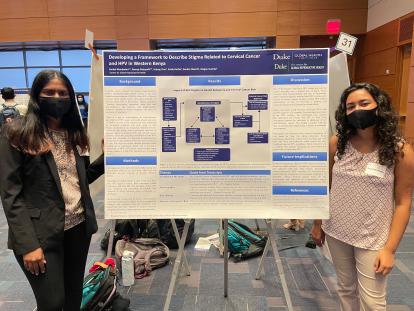
Ramya Ginjupalli, left, and Rachel Mundaden
Published February 23, 2022, last updated on March 9, 2022 under Research News
Ramya Ginjupalli and Rachel Mundaden met during their freshman year at Duke when they both lived in Bell Tower residence hall on east campus. Now, as seniors, their friendship has produced something they didn’t ever anticipate: a research paper.
They are co-authors on a study, published Feb. 11, by BioMed Central Women’s Health Journal. The research focuses on stigma related to cervical cancer and human papillomavirus (HPV) in women in Western Kenya.
“It was pretty exciting,” says Mundaden, who is majoring in biology and global health. “It was really cool to spearhead the research as undergrad students. It felt like we were discovering something new by mapping out the trends we saw.”
The research grew out of a Student Research Training (SRT) project collaborating with partners in Kisumu, Kenya, during summer 2020. As part of that project, students explored the drivers and manifestations of stigma related to HPV and cervical cancer. From there, Ginjupalli and Mundaden led a study suggesting ways to reduce stigma and overcome barriers to care through messaging and educational tools.
Co-authors on the study included Emily Herfel, a student in DGHI’s Master of Science in Global Health program, and MS-GH alumna Yujung Choi. Along with Melissa Watt, Ph.D., an associate professor at the University of Utah and former DGHI professor, and Megan Huchko, M.D., director of the Center for Global Reproductive Health at Duke and a DGHI associate professor.
“Rachel and Ramya really applied themselves to this work over the summer of 2020 and have stayed involved with the project since then,” says Huchko, who advised the SRT team. “They have a great work ethic and thoughtful intellect that allowed them to carry out this pretty nuanced analysis.”
Ginjupalli and Mundaden say support from their team and Huchko gave them the confidence to elevate their work to a published paper.
“It was scary, taking a leap of faith, but we felt really supported with our mentors,” says Ginjupalli, who is studying evolutionary anthropology and global health.

Ramya Ginjupalli, left, and Rachel...
The research built on a previous SRT project in Kenya, also supervised by Huchko, during the summer of 2019. Students on that team interviewed 26 women who were living with HIV, along with community healthcare workers and others, to understand crossovers between HIV infection and barriers to cervical cancer screening and care. In some cases, women said they didn’t want to see a doctor because they feared catching HPV, even by just sitting on an exam table.
Ginjupalli and Mundaden both say misinformation was the biggest factor in providing patient care. “In some communities, religious leaders believed in just prayer and not going to the doctor,” Mundaden says.
“Also, we found so many other barriers preventing individuals from seeking care, such as a support system, which is a necessity in global health,” Ginjupalli says. “One of our interviewees was a woman who lacked a support system, so she struggled to get childcare while she walked to the clinic. Even if she wanted to take the bus, the roads weren’t good enough.”
The pair’s work was completed in the U.S. because of COVID-19 travel restrictions. They spent hours on Zoom and email to work with their research partners in Kenya. Both students say despite missing the opportunity to have a research experience abroad, they credit their fellow co-authors for making the work possible – especially Huchko.
“Dr. Huchko really takes her time to empower research students in her lab,” says Ginjupalli. “When we needed to be pulled up, she helped us along the way. I can’t overstate how helpful she was.”
As their senior years come to a close, both students plan to continue on tracks in medicine. Ginjupalli wants to work in pediatrics, while Mundaden is interested in working in sexual/reproductive health, possibly as an OB/GYN. Both say their research experience will benefit them as they pursue their next steps.
“This project gave me more confidence in conducting independent research, and taught me how to be flexible in unpredictable circumstances,” even as a senior, Mundaden says.
“There’s really no end to research, the more you discover, the more questions you have,” Ginjupalli says. “The key is to find an area of research you’re interested in because your passion will show in your work.”


